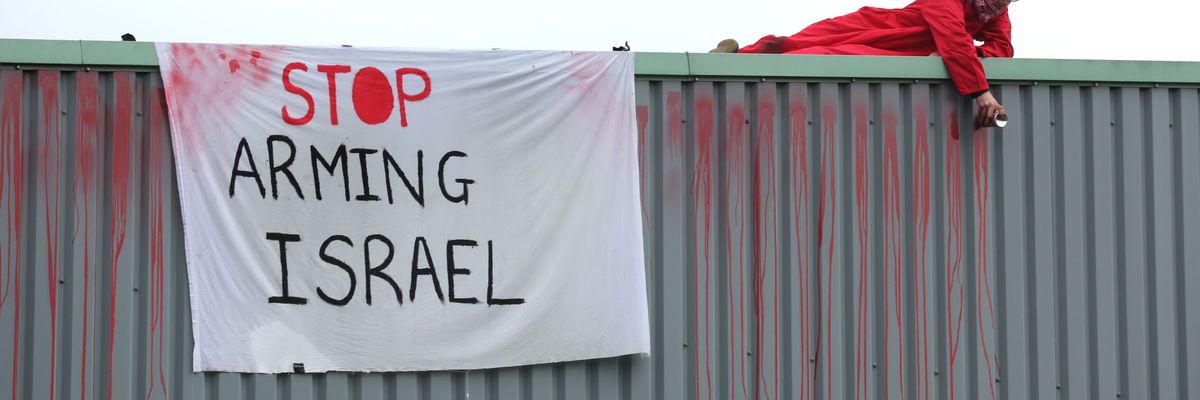While the White House has claimed U.S. President Joe Biden is growing increasingly "frustrated" with Israel's bombardment of Gaza—largely made possible by U.S. military aid—calls are growing in Europe for governments to halt arms exports to stop their own contributions to the mass killing.
After a Dutch court ordered the Netherlands to stop exporting F-35 fighter jet parts to Israel on Monday, ruling that the country was running a "clear risk" of helping Israel to violate international human rights law, several British lawmakers intensified their demands that the U.K. also halt arms exports.
"Selling arms to Israel for its war on Gaza is incompatible with U.K. and international law," said Diane Abbott, a Labour Party member in British Parliament. "[Prime Minister Rishi] Sunak should follow suit and ban weapon sales to Israel."
Natalie Bennett, a member of the Green Party in the British House of Lords, spoke on Tuesday about six-year-old Hind Rajab, whose body was found last week in a car in which her family members had tried to flee Gaza City. The car was riddled with bullet holes, and an ambulance nearby, which paramedics had sent to rescue Hind, had been bombed.
"Is the government challenging the Israeli government about risks to hundreds of thousands of children in Rafah, now in the path of the Israeli offensive?" said Bennett. "Surely it's time to stop all arm shipments to Israel... and implement targeted sanctions against members of the Israeli leadership."
The U.K. provides about 15% of the components of Israel's F-35 bombers—the Israeli Air Force's "flagship asset," according to the Royal United Services Institute—and has licensed more than $594 million in military exports to Israel since 2015.
While the U.S. Senate on Tuesday passed a $95 billion foreign aid bill, including $14.1 billion for Israel, some European governments are working to end their complicity in Israel's mass killing of at least 28,576 Palestinians so far in attacks that have also wounded at least 68,291 and left at least 17,000 children orphaned.
On February 6, the Walloon regional government in Belgium suspended two licenses for the export gunpowder to Israel, citing the International Court of Justice's (ICJ) interim ruling last month which found that Israel is "plausibly" committing a genocide in Gaza.
Italian Foreign Minister Antonio Tajani said in late January that the government had halted all arms sales to Israel in October, when Israel began its bombardment of Gaza in retaliation for a Hamas-led attack on October 7.
José Albares, Spain's foreign minister, also said last month that the Spanish government had done the same, but El Diarioreported on Sunday that the country had actually exported $1.1 million in ammunition to Israel in November.
"The suspension of arms transfers to Israel must be comprehensive and permanent, and not just temporary," said Alberto Estévez, a spokesperson on weapons issues at Amnesty International Spain. "The Spanish government has wanted to be an example in this crisis in the face of other much more complicit governments, but it must be more forceful to promote a European arms embargo on Israel and Hamas and other Palestinian armed groups, in addition to pressuring the United States to stop the supply of arms to Israel and support the imposition of a global embargo on the U.N. Security Council."
On Wednesday, Spanish Prime Minister Pedro Sánchez joined Irish Prime Minister Leo Varadkar in writing to European Commission President Ursula von der Leyen and demanding an "urgent review" of Israel's compliance with human rights obligations under its trade deal with the European Union.
"Against the background of the risk of an even greater humanitarian catastrophe posed by the imminent threat of Israeli military operations in Rafah, and given what has occurred, and continues to occur in Gaza since October 2023, including widespread concern about possible breaches of international humanitarian law and international human rights laws by Israel, we ask that the Commission undertake an urgent review of whether Israel is complying with its obligations, including under the E.U./Israel Association Agreement, which makes respect for human rights and democratic principles an essential element of the relationship," wrote Sánchez and Varadkar.
The two leaders reiterated their call for an immediate humanitarian cease-fire, which was supported by a large majority of countries in a vote at the U.N. General Assembly in December, "including by 17 E.U. member states."
Varadkar and Sánchez also pointed to the ICJ's interim ruling in South Africa's case last month, in which the country accused Israel of genocidal violence against Palestinians.
The orders of the ICJ, which demanded that Israel ensure that humanitarian aid can reach Gaza residents and that its military is not committing acts of genocide, "are binding," the leaders reminded the European Union.
